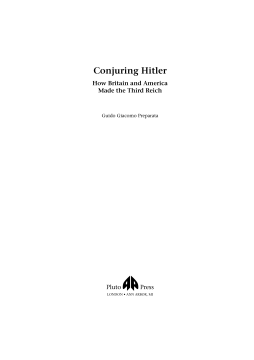
Additional Information
Book Details
Abstract
Nazism is usually depicted as the outcome of political blunders and unique economic factors: we are told that it could not be prevented, and that it will never be repeated.
In this explosive book, Guido Giacomo Preparata shows that the truth is very different: using meticulous economic analysis, he demonstrates that Hitler's extraordinary rise to power was in fact facilitated - and eventually financed - by the British and American political classes during the decade following World War I.
Through a close analysis of events in the Third Reich, Preparata unveils a startling history of Anglo-American geopolitical interests in the early twentieth century. Showing that Nazism was not regarded as an aberration: for the British and American establishment of the time, it was regarded as a convenient way of destabilising Europe and driving Germany into conflict with Stalinist Russia, thus preventing the formation of any rival continental power block. In laying bare the economic forces at play in the Third Reich, Guido Giacomo Preparata identifies the key players in the British and American establishment who aided Hitler's meteoric rise.
'The most important book on modern European history since George Lichtheim's Europe in the Twentieth Century'
Professor David MacGregor, University of Western Ontario
Table of Contents
| Section Title | Page | Action | Price |
|---|---|---|---|
| Contents | 4 | ||
| 1. Introductory: The Eurasian Embrace. Laying Siege to Germany with World War I, 1900 - 18 | 17 | ||
| The Second Reich: The Tragedy of an Imperial Upstart | 17 | ||
| The Heartland, the Crescent and the Nightmare of British Geopolitics | 24 | ||
| The Blood of the Romanovs and the Encirclement of Germany | 31 | ||
| The 'Useful Idiots' of Sarajevo | 36 | ||
| Besieging Germany | 38 | ||
| Conjuring Lenin | 43 | ||
| The Last Days of America: from Republic to Truculent Empire | 54 | ||
| 2. The Veblenian Prophecy. From the Councils to Versailles by Way of Russian Fratricide, 1919 - 20 | 58 | ||
| The Impossible Revolution | 58 | ||
| Inducting Hitler into the Mother Lodge | 73 | ||
| The Allied Betrayal of the Russian Whites | 76 | ||
| The Peace Treaty That Was Too Harsh | 90 | ||
| Dreaming of Hitler and Deciphering Versailles | 96 | ||
| 3. The Meltdown and the Geopolitical Correctness of Mein Kampf Between the Kapp and the Beerhall Putsch, 1920 - 23 | 105 | ||
| Erzberger: One Man Alone against the Inflation | 105 | ||
| Hiring Trebitsch- Lincoln to Foil the Kapp Putsch | 114 | ||
| Rathenau, The Reluctant Victim of the Russo- German Pact | 128 | ||
| The Hyperinflationary Purge of 1923 | 137 | ||
| The Maiden Storm of the Nazi Fundamentalists | 146 | ||
| 4. 'Death on the Installment Plan' Whereby Governor Norman Came to Pace the Damnation of Europe, 1924 - 33 | 154 | ||
| The Banking 'Grid' and the Rules of the Gold Game | 154 | ||
| Montagu Norman and the 'Nationalization' of the Bank | 163 | ||
| The Dawes Bailout and the Hierodule Schacht | 175 | ||
| I. G. Farben and Germany's First Five- Year Plan | 181 | ||
| Britain's Grand Charade to Crash the New Gold Standard | 187 | ||
| The Last Scheme of Kurt von Schleicher and the End of Weimar | 197 | ||
| 5. The Reich on the Marble Cliffs. Fire, Legerdemain and Mummery all the Way to Barbarossa, 1933 - 41 | 218 | ||
| Nazi Coup d'Etat | 219 | ||
| Money Magic, Work Creation and Foreign Aid | 227 | ||
| A British Masquerade to Entrap the Germans Anew | 244 | ||
| A Soviet Tale of Madness and Sacrifice | 260 | ||
| Fake War in the West, True Push in the East | 270 | ||
| 6. Conclusion | 279 | ||
| Notes | 285 | ||
| Select Bibliography | 311 | ||
| Index | 321 |
